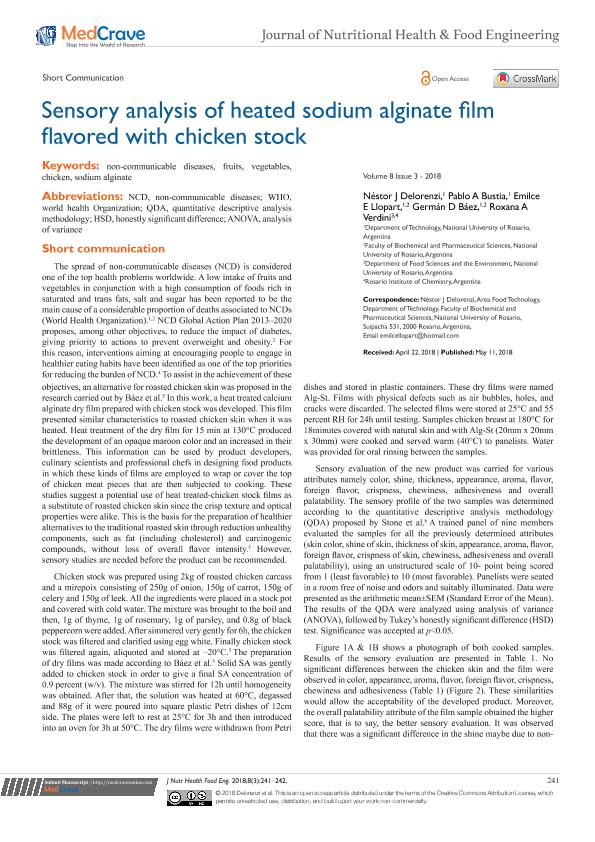Artículo
Sensory analysis of heated sodium alginate film flavored with chicken stock
Delorenzi, Nestor Jorge; Busti, Pablo Andres; Llopart, Emilce Elina ; Báez, Germán David
; Báez, Germán David ; Verdini, Roxana Andrea
; Verdini, Roxana Andrea
 ; Báez, Germán David
; Báez, Germán David ; Verdini, Roxana Andrea
; Verdini, Roxana Andrea
Fecha de publicación:
05/2018
Editorial:
MedCrave
Revista:
Journal of Nutritional Health & Food Engineering
ISSN:
2373-4310
e-ISSN:
2373-4310
Idioma:
Inglés
Tipo de recurso:
Artículo publicado
Clasificación temática:
Resumen
The spread of non-communicable diseases (NCD) is considered one of the top health problems worldwide. A low intake of fruits and vegetables in conjunction with a high consumption of foods rich in saturated and trans fats, salt and sugar has been reported to be the main cause of a considerable proportion of deaths associated to NCDs (World Health Organization (WHO), 2009; WHO, 2011). NCD Global Action Plan 2013?2020 proposes, among other objectives, to reduce the impact of diabetes, giving priority to actions to prevent overweight and obesity (WHO, 2016). For this reason, interventions aiming at encouraging people to engage in healthier eating habits have been identified as one of the top priorities for reducing the burden of NCD (Beaglehole et al., 2011). To assist in the achievement of these objectives, an alternative for roasted chicken skin was proposed in the research carried out by Báez et al. (2017). In this work, a heat treated calcium alginate dry film prepared with chicken stock was developed. This film presented similar characteristics to roasted chicken skin when it was heated. Heat treatment of the dry film for 15 min at 130 °C produced the development of an opaque maroon color and an increased in their brittleness. This information can be used by product developers, culinary scientists and professional chefs in designing food products in which these kinds of films are employed to wrap or cover the top of chicken meat pieces that are then subjected to cooking. These studies suggest a potential use of heat treated-chicken stock films as a substitute of roasted chicken skin since the crisp texture and optical properties were alike. This is the basis for the preparation of healthier alternatives to the traditional roasted skin through reduction unhealthy components, such as fat (including cholesterol) and carcinogenic compounds, without loss of overall flavor intensity (Báez et al., 2017). However, sensory studies are needed before the product can be recommended.
Palabras clave:
NON-COMMUNICABLE DISEASES
,
VEGETABLES
,
CHICKEN
,
SODIUM ALGINATE
Archivos asociados
Licencia
Identificadores
Colecciones
Articulos(CCT - ROSARIO)
Articulos de CTRO.CIENTIFICO TECNOL.CONICET - ROSARIO
Articulos de CTRO.CIENTIFICO TECNOL.CONICET - ROSARIO
Citación
Delorenzi, Nestor Jorge; Busti, Pablo Andres; Llopart, Emilce Elina; Báez, Germán David; Verdini, Roxana Andrea; Sensory analysis of heated sodium alginate film flavored with chicken stock; MedCrave ; Journal of Nutritional Health & Food Engineering; 8; 3; 5-2018; 241-242
Compartir
Altmétricas



